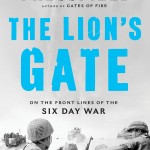 Steven Pressfield’s latest, The Lion’s Gate
Steven Pressfield’s latest, The Lion’s Gate, is something of a departure from his previous books. Of the three I’d read previously, Gates of Fire and The Virtues of War take place in the ancient world, and Killing Rommel takes place in North Africa during World War II. (Good grief! I’ve just discovered I’ve not reviewed that one! I’ll have to fix that.) And The Lion’s Gate isn’t even a novel. But like the previous three, it is carefully researched and a delight (at least for this history buff) from end to end.
What it is, is a kind of oral history of the Six Day War. Pressfield has made a career of writing about decisive battles—turning points in history—and the Six Day War is a prime example.
The Six Day War took place in June of 1967, when I was just shy of four years old. Prior to reading this book I knew almost nothing about it except that it involved Israel and that Israel had won; and since many others my age and younger are probably in a similar boat (and since the number of people who are younger than me is much larger than it used to be) it’s worth giving some background.
The modern state of Israel was founded with a certain amount of bloodshed in 1948, and the resulting settlement left strategic areas in the hands of Israel’s enemies. Jordan controlled the West Bank of the Jordan river and the Old City of Jerusalem; Egypt held the Sinai peninsula; and Syria the Golan Heights. I think of Israel as a modern, high-tech country but in those days it was dirt poor (literally); most Israelis were farmers (when they weren’t being soldiers) trying to scratch a living out of the earth of the Promised Land, and most had come there from other parts of the world.
In the late 1950’s, the Israelis took the Sinai peninsula but were forced by the United Nations and the “Great Powers” to give it back; however, control of it effectively passed into the hands of U.N. peacekeepers. This was a significant campaign; Israel had learned to do more with less, to leave as little as possible to chance, and to ruthlessly exploit any advantage the enemy gave without waiting for orders from higher up. The leaders of the Israeli Defense and Air Forces in 1967 were mostly veterans of the Sinai campaign.
In 1967, Egypt kicked the peacekeepers out of the Sinai and set up their own defenses in preparation for an invasion of Israel. Heated rhetoric was heard from all of the Arab nations in the vicinity, and their forces were being prepared to wipe Israel off of the map. The comparison with the story of David and Goliath is trite but apt; and like David, Israel did not wait for Egypt but attacked first and in a way her enemies did not expect.
On 5 June 1967, Israel (like Han Solo) shot first, destroying Egypt’s air power in a matter of hours and then proceeding to drive the Egyptians out of Sinai. When the dust settled a week later, Israel held the West Bank, the Gaza Strip, the Sinai, Jerusalem, and most of the Golan Heights. Whatever you might think of the rights and wrongs of the situation (and I confess my sympathies are with the Israelis) it was a stunning achievement. For the first time since the destruction of the Temple in AD 70 the city of Jerusalem was under Jewish control.
As I say, The Lion’s Gate is something of an oral history; but it isn’t a history of the entire war. Pressfield follows members of three units (a squadron of the Israeli Air Force, the recon company that was first to the Suez Canal, and the paratroop battalion that was the first to the Wailing Wall), and his goal is record not so much the major events of the war but the firsthand experiences of the people who fought in it. To that end he conducted almost 400 hours of interviews with 63 survivors of the war, and the resulting book is almost entirely in their voices. We hear what they saw and heard during the war; and for some of the veterans we also hear about their experiences in 1957 and 1948.
I enjoyed the whole book, but the two parts I enjoyed the most were the descriptions of Operation Moked (the air assault that destroyed the Egyptian Air Force), and of the taking of Jerusalem.
Israel had few planes, all of them fighters retrofitted to carry one bomb each. In Operation Moked, each Egyptian airfield was targeted by four-plan squadrons whose pilots had been trained exhaustively on the airfield and the proper approach to it. Each squadron followed a very specific, very low altitude path to a landmark near its target, carefully avoiding the radar; stood on their tails to climb to 6,000 feet; verified the location of the target; and dove to bomb each runway at just the right angle and position to cut it severely in multiple places. They would then proceed in a cloverleaf pattern, using their cannon to shoot up the planes on the ground. And then they would return to their home field to refuel and re-arm, and they would go out again.
Nothing was left to chance. It had been clear to the IAF years earlier that such an attack would be necessary, and they had made sure to acquire the intelligence they needed, and spent years in training. Each squadron was trained to attack a specific airfield, and had to know the details of the flight plan absolutely by heart. The precise angle of attack needed to maximize damage to runways was determined, and practiced over and over again. And the overall dictum was simple: if you can refuel and re-arm quickly enough you can turn one plane into four.
My favorite detail: they scheduled all of the attacks to begin at 7:45 in the morning. At 7:45 every day, the pilots at each airfield had completed their dawn patrols and were reliably in the mess hall having breakfast, leaving their planes on the ground.
The attack on Jerusalem was entirely different. First, it was unplanned. The operational plans called for all ground forces to fight against the Egyptians in the Sinai; Jerusalem was held by Jordan, and Jordan’s King Hussein (a man well known to Moshe Dayan and other top leaders) was known to be lukewarm about destroying Israel. He talked tough on the air to placate his people and his allies (or he would likely have lost his head) but it was hoped that Jordan might stay out of the war if left alone. But in the event, Jordan sent air missions into Israel; and the Sinai campaign went much better than expected. Moshe Dayan sent a paratroop force to attack Jordan-held territory around the city of Jerusalem.
This is the point: he didn’t attack the Old City, but the area around it. Many in the government, including Menachem Begin, were pushing him to attack the Old City itself, but Dayan refused: one stray missile into any of the Muslim or Christian holy places could cause any support for Israel to evaporate.
And then, when the assault around Jerusalem was clearly succeeding the Jordanians pulled out of the area—including out of the Old City. The IDF captured Jerusalem, but without fighting. King Hussein had evidently decided that it was better to lose control of the holy places than to risk losing them completely. It was a good decision; Dayan and the other leaders accorded the Muslim and Christian holy places the respect that the Jews were demanding for themselves, and when a soldier with more zeal than sense flew an Israeli flag from the Dome of the Rock Moshe Dayan ordered it taken down immediately.
The Lion’s Gate is written unabashedly from the Israeli point of view; Pressfield, a secular Jew, was a U.S. Marine when the Six Day War erupted, and several years ago, when in the grip of what he jokingly calls “a Jewish mid-life crisis”, he decided to write about his own people. As a military history buff the Six Day War was the obvious choice. But at the same time, the book does not attempt to demonize Israel’s opponents. The truth is told, but it is not exaggerated; and multiple times in the book, various of the people Pressfield interviewed stressed that the Israeli victory was not due to cowardice or lack of skill on the part of the Egyptian forces, but rather to a skillful exploitation of Egyptian military doctrine and command structures.
I called it a “kind” of oral history, because Pressfield did take certain liberties (as he is quick to point out in the introduction.) He drew freely on existing documentaries and writings of the people he interviewed, and folded that material seamlessly into the first person narratives he recorded himself (always with the approval of the individuals involved). Moshe Dayan died in 1981, but there are a number of sections told in Moshe Dayan’s voice, as though Pressfield had interviewed him.
I was surprised by this book in a number of ways. My notions of Israel are unavoidably colored by my impressions of the biblical kingdoms of Israel and Judah in the days of David, Solomon, and their successors; though I knew better, from other reading I’ve done, I still rather expected the Israelis to be zealous followers of Judaism. Some were; but many of the early Zionists were atheists and socialists. Also, because today Israel is a modern high-tech state I rather expected the Israelis of 1967 to be more or less like Americans who happened to live in the Middle East. That couldn’t have been further from the case. Most of the younger generation in 1967 had been born in Israel, often on the kibbutz; many of the soldiers he interviews had never been even as far as Tel Aviv until the time came to go to war. And what all of them knew as they were growing up was that their homeland was surrounded by enemies and that it was up to them if Israel were to survive.
The Lion’s Gate is a book I’m going to be thinking about for a long time. Highly recommended.
Note: I received a review copy of this book. I don’t often accept review copies any more; it was a delight to get one I’d have bought eventually anyway, and a greater delight to like it so much. (If I hadn’t liked it, you’d never have heard about the book from me.)












